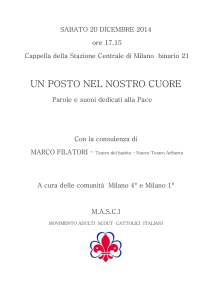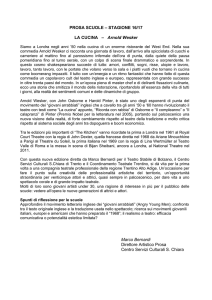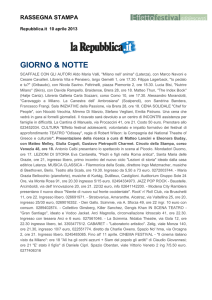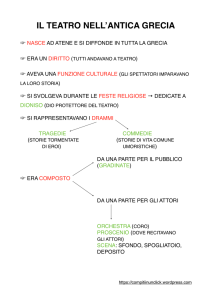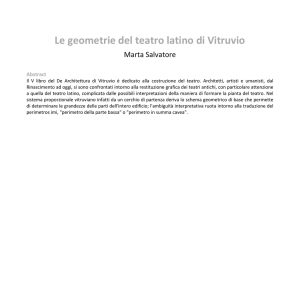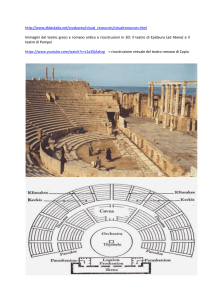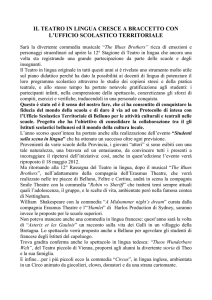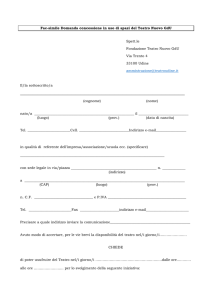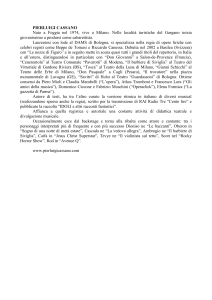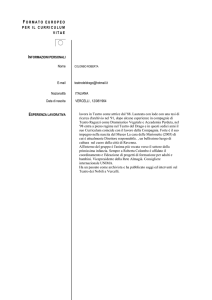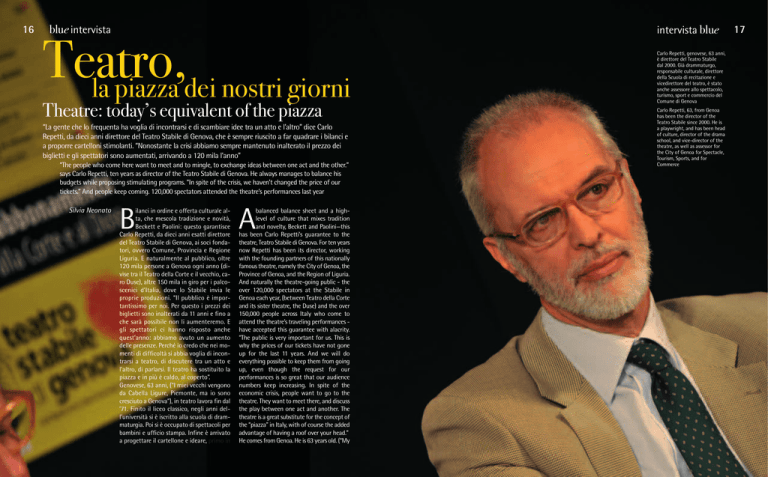
16
blue intervista
Teatro,
la piazza dei nostri giorni
Theatre: today’s equivalent of the piazza
“La gente che lo frequenta ha voglia di incontrarsi e di scambiare idee tra un atto e l’altro” dice Carlo
Repetti, da dieci anni direttore del Teatro Stabile di Genova, che è sempre riuscito a far quadrare i bilanci e
a proporre cartelloni stimolanti. “Nonostante la crisi abbiamo sempre mantenuto inalterato il prezzo dei
biglietti e gli spettatori sono aumentati, arrivando a 120 mila l’anno”
“The people who come here want to meet and to mingle, to exchange ideas between one act and the other.”
says Carlo Repetti, ten years as director of the Teatro Stabile di Genova. He always manages to balance his
budgets while proposing stimulating programs. “In spite of the crisis, we haven’t changed the price of our
tickets.” And people keep coming. 120,000 spectators attended the theatre’s performances last year
Silvia Neonato
ilanci in ordine e offerta culturale alta, che mescola tradizione e novità,
Beckett e Paolini: questo garantisce
Carlo Repetti, da dieci anni esatti direttore
del Teatro Stabile di Genova, ai soci fondatori, ovvero Comune, Provincia e Regione
Liguria. E naturalmente al pubblico, oltre
120 mila persone a Genova ogni anno (divise tra il Teatro della Corte e il vecchio, caro Duse), altre 150 mila in giro per i palcoscenici d’Italia, dove lo Stabile invia le
proprie produzioni. “Il pubblico è importantissimo per noi. Per questo i prezzi dei
biglietti sono inalterati da 11 anni e fino a
che sarà possibile non li aumenteremo. E
gli spettatori ci hanno risposto anche
quest’anno: abbiamo avuto un aumento
delle presenze. Perché io credo che nei momenti di difficoltà si abbia voglia di incontrarsi a teatro, di discutere tra un atto e
l’altro, di parlarsi. Il teatro ha sostituito la
piazza e in più è caldo, al coperto”.
Genovese, 63 anni, (“I miei vecchi vengono
da Cabella Ligure, Piemonte, ma io sono
cresciuto a Genova”), in teatro lavora fin dal
’71. Finito il liceo classico, negli anni dell’università si è iscritto alla scuola di drammaturgia. Poi si è occupato di spettacoli per
bambini e ufficio stampa. Infine è arrivato
a progettare il cartellone e ideare, primo in
B
balanced balance sheet and a highlevel of culture that mixes tradition
and novelty, Beckett and Paolini—this
has been Carlo Repetti’s guarantee to the
theatre, Teatro Stabile di Genova. For ten years
now Repetti has been its director, working
with the founding partners of this nationally
famous theatre, namely the City of Genoa, the
Province of Genoa, and the Region of Liguria.
And naturally the theatre-going public - the
over 120,000 spectators at the Stabile in
Genoa each year, (between Teatro della Corte
and its sister theatre, the Duse) and the over
150,000 people across Italy who come to
attend the theatre’s traveling performances have accepted this guarantee with alacrity.
“The public is very important for us. This is
why the prices of our tickets have not gone
up for the last 11 years. And we will do
everything possible to keep them from going
up, even though the request for our
performances is so great that our audience
numbers keep increasing. In spite of the
economic crisis, people want to go to the
theatre. They want to meet there, and discuss
the play between one act and another. The
theatre is a great substitute for the concept of
the “piazza” in Italy, with of course the added
advantage of having a roof over your head.”
He comes from Genoa. He is 63 years old. (“My
A
intervista blue
Carlo Repetti, genovese, 63 anni,
è direttore del Teatro Stabile
dal 2000. Già drammaturgo,
responsabile culturale, direttore
della Scuola di recitazione e
vicedirettore del teatro, è stato
anche assessore allo spettacolo,
turismo, sport e commercio del
Comune di Genova
Carlo Repetti, 63, from Genoa
has been the director of the
Teatro Stabile since 2000. He is
a playwright, and has been head
of culture, director of the drama
school, and vice-director of the
theatre, as well as assessor for
the City of Genoa for Spectacle,
Tourism, Sports, and for
Commerce
17
blue intervista
Repetti insieme a Eros Pagni e Mariangela Melato (a sinistra) e Edoardo Sanguineti
(sotto): prima della sua scomparsa dello scorso maggio, il poeta stava lavorando alla
traduzione di Misura per misura di Shakespeare, in scena alla corte con la regia di
Marco Sciaccaluga dal 15 ottobre. Nelle altre foto alcuni dei grandi del mondo
dello spettacolo italiano lanciati dalla Scuola di recitazione dello Stabile: i genovesi
Luca e Paolo e Tullio Solenghi
19
Repetti together with Eros Pagni and Mariangela Melato (at left), and Edoardo
Sanguineti (below). The poet just before his death last May was working on the
translation of Shakespeare’s “Measure for Measure”, which will be presented at the
Teatro della Corte on October 15, directed by Marco Sciaccaluga. In the other
photos, some of the stars of Italian theatre who have been launched on their
careers by the Drama School of the Teatro Stabile: the Genoese comedians, Luca
and Paolo and Tullio Solenghi
Flickr/FR_Z
18
Italia - all’interno del ciclo di letture “Le
grandi parole” - la lettura dei tre canti della Divina Commedia (1983-86). “Letture
gratuite con grandi attori sempre al servizio
del pubblico, che deve sentirsi a casa nel
suo teatro cittadino. Così siamo arrivati al
ciclo di quest’anno, “Fare gli italiani” (2010)
che proseguirà anche nella prossima stagione”, spiega.
Q u a n d o le g g e v a t e l a D i v i n a C o m m e d i a
l a p o l iz i a d o v e v a t e n e r b u o n a l a g e n t e
c h e no n p o t e v a e n t r a r e .
Già, un successo enorme per tre anni, poi
facemmo Montale e poi i discorsi di uomini celebri, conosciuti o che abbiamo di-
parents were actually from Cabella Ligure in
the Piedmont, but I grew up in Genoa.”) He
has been working in the theatre since 1971.
After Repetti finished his Classics High School,
he studied drama while at university.
Beginning with children’s shows and press
offices, he came up with the idea, and
organized in a cycle of readings called “The
Great Words”, the reading of three “canti”
from the Divine Comedy (1983-86), a first in
Italy. “Free readings by great actors serving the
public, feeling at home in their own city
theatre.” This led to the concept of this year’s
cycle, “Making Italians” (2010) which he
explains, will continue next season.
menticato: quello di Mandela ai giudici
quando lo condannarono. O un discorso degli anni Trenta di Hitler che già conteneva
molte posizioni antiebraiche o quelli populisti di Evita Peron che incendiava le piazze.
E il pubblico viene, appunto parla negli intervalli, si scambia idee, confronta il passato e l’attualità mentre la politica e le altre
forze sociali segnano il passo.
C ome v a la s cuol a di teat ro?
Bene, sono dieci iscritti all’anno con obbligo di frequenza per un triennio. Non pagano, ma devono mantenersi. Però dallo Stabile di Genova sono usciti tanti attori di
successo. Ad esempio i maggiori comici italiani degli ultimi anni: Crozza, Signoris, Solenghi, Luca e Paolo, Olcese e Margiotta, Dighero, Cesena… Ottimi attori di teatro, ma
che trovano spazio anche in tv e al cinema.
A parte i comici, abbiamo oggi una trentina di attori tra i 20 e i 45 anni che sono
considerati tra i migliori sulla piazza. Dopo
quella di Squarzina e Chiesa negli anni ’70,
in questi dieci anni abbiamo ricostituito
una compagni molto forte, che ci permet-
When you were reading the Divine
Comedy, the police had to be called in to
hold back the crowds.
“Well, yes. It was a great success. And for three
years. Then we did Montale [the Genoese poet
who won the Nobel Prize for literature], and
then forgotten or remembered speeches of
famous people, like Mandela’s speech to the
judges who condemned him. We did one of
Hitler’s speeches from the thirties, against the
Jews, a couple of populist speeches by Evita
Peron, that set the people alight. And our
audience came and came. They chatted about
us in the intervals, talked about what they
had just heard, exchanged ideas, confronted
the past and the present. Politics and other
social forces follow naturally after.”
How is you theatre school going?
Let’s see, there are ten students per year who
have to attend at least a semester. They don’t
pay us, but they have to support themselves.
Our theatre, Stabile di Genova, has produced
many successful actors, including some of
Italy’s best comic actors: Crozza, Signoris,
Solenghi, Luca and Paolo, Olcese and
Da Mel a to a Pa ol i ni t ra tra di zi o ne e nov i tà
From M el at o t o Paol i ni : B et ween the Tra di ti o nal and t he Ne w
Il 12 ottobre debutta al Duse “Questa sera si recita a soggetto” di Pirandello realizzata da Gank, una delle compagnie costituita da ex allievi
dello Stabile che, quando non sono impegnati col teatro, producono in proprio. Poi il 15 la prima alla Corte con Eros Pagni che interpreta
“Misura per misura” di Shakespeare. Ma l’annata, vivace come sempre, prevede 44 spettacoli di cui 11 di produzione propria più due riprese in
tournée (A corpo morto di Vittorio Franceschi e Aspettando Godot di Samuel Beckett). Tra gli altri sono previsti la Melato che fa Ibsen con la
regia di Marco Sciaccaluga e Giampiero Alloiso, che racconta la vita di Umberto Bindi in La musica è infinita, per il quale ha trovato anche
musiche inedite del musicista scomparso…Poi c’è un testo nuovo di Andrea Liberovici, mentre tornano Glauco Mauri, Marco Paolini, Ovadia e
Laura Curino con un lavoro su Enrico Mattei. C’è un Garcia Lorca del Piccolo di Milano, a Natale Lello Arena interpreta Scapetta, mentre il
Teatro del Piemonte propone Donne informati dei fatti di Carlo Fruttero.
On October 12, Pirandello’s “Questa sera si recita a soggetto” (Tonight We Will Recite by Subject) will make its debut with Gank, a company
made up of Teatro Stabile ex-alumi. When they are not busy in the theatre, they are busy making their own productions. Then on the 15th,
the Corte will present Shakespeare’s “Measure for Measure”. This year’s offering is of 44 shows, of which 11 are their own productions, and
2 are taken from their touring shows (A corpo morto by Vittorio Franceschi and Waiting for Godot by Samuel Beckett). Among the plays are
Ibsen—featuring the immortal Melato, directed by Marco Sciaccaluga—and Giampiero Alloiso, who tells of the life of Umberto Bindi in La
musica è infinita, (The Music Never Ends), which actually features some of the composer’s unpublished works. Then there is a new text by
Andrea Liberovici; Glauco Mauri, Marco Paolini, Ovadia and Laura Curino will be back in a new play by Enrico Mattei; there’s a Garcia Lorca
from the Piccolo of Milan; at Christmas Lello Arena will play Scapetta; and the Teatro del Piemonte proposes Donne informati dei fatti
(Women Informed of the Facts) by Carlo Fruttero.
20
blue intervista
Marco Paolini, una delle star del
tabellone 2010-2011, sul palco
genovese a marzo
Marco Paolini, one of the stars
of 2010-2011, on the stage at
the Genovese in March
intervista blue
te di fare ad esempio i lavori di Shakespeare, che prevedono tanti attori e tanti denari: noi riceviamo denaro pubblico, dobbiamo fare lavorare i giovani e poi fare i
classici, anche se hanno costi alti.
A propos ito, ci fa ccia qual che es empi o di
q u a n t o s i p a g a u n b i g l i e t t o q u es t a s t a g io n e ?
Il costo di un singolo spettacolo di primo
settore va dai 15,49 euro degli abbonati agli
8 euro per i giovani. Poi c’è chi ha una riduzione e spende 12,90. Gli abbonamenti
partono da 139 euro quelli ridotti (scuole,
aziende, circoscrizioni, associazioni) che
danno diritto a vedere ben 15 spettacoli. Mi
sembrano prezzi alla portata di molti, se
non proprio di tutti.
Q ua n t i d i p e n d e n t i s i e t e ?
Tra fissi e stagionali circa 150, di cui un centinaio con contratto stabile. Nella programmazione mi danno una mano il nostro unico regista stabile Marco Sciaccaluga, la
segretaria generale Anna Nano e Aldo Vigano, consulente da sempre.
H a f a t t o q u e l l o c h e d e s i d e ra v a , n o ?
Sì, prima la grande scuola di teatro con
Chiesa e Squarzina, poi una bella
esperienza politica di amministratore comunale. Sono stato assessore alla cultura con la giunta di
Burlando e Merlo dal ’90 al ’93 e
poi con Beppe Pericu dal ’97 al
2000, l’anno in cui ho avuto
la direzione dello Stabile. Sono stati anni
buoni, prima le
Colombiane,
poi Genova
capitale europea della Cultura: con i
fondi
dello
Stato
sono
state liberate
la zona del Porto Antico e creato
l’Acquario, si è trasformato il volto
della città restaurando gli antichi
Margiotta, Dighero, Cesena… Great actors for
the theatre, but they have also done well on
TV and in the movies. In addition to our
comedians, we have today about thirty actors
between the ages of 20 and 45 who are
considered to be among the best in Italy. After
Squarzina and Chiesa in the seventies, during
the last ten years we have put together a very
strong company which lets us do things like,
for example, Shakespeare, which needs lots of
actors and lots of money. Since we are the
recipients of public funds, we must give work
to the younger generation and do the classics,
even if the costs are high.
Speaking of costs, can you give us an
example of ticket pricing this season?
A ticket for a one night show in the best
section for those with a subscription only
costs 15.49 euros; for those with special
discounts, 12.90; and for students we offer an
8 euro special. Season’s tickets start from 139
euros for those who have special discounts
(schools, companies, clubs, associations) with
15 shows to choose from.
How many are y ou? That is, how many
people does it take to run a theatre?
Between permanent and seasonal employees,
about 150. Say about a hundred people have
a steady contract. To put together the
program our only continuous director, Marco
Sciaccaluga, Anna Nano, and our permanent
consultant, Aldo Vigano, all help me out.
Well, you did what you wanted to do,
right?
Yes. First with the great theatre school
under Chiesa and Squarzina. Then a nice
little political experience as a city
administrator - I was Assessor for Culture
under the junta of Burlando and Merlo in
1990 and 1993, and then under [Mayor]
Beppe Pericu from 1997 until 2000, the year
I took over the Teatro Stabile. Those were
good years. First came the Columbian
Exposition, then Genoa as the European
Capital for Culture - the funds we were
given got us the Aquarium and cleaned up
the area of the old port. We changed the
face of the city, renovating the old facades
of the ancient palaces, converting heavy
industry areas into something lighter…I feel
that so many things were done for the city.
palazzi e convertendo le aree dimesse dall’industria pesante per puntare su quella
leggera. Mi sembra si siano fatte tante cose per la città.
Q u e s t ’ a nn o p e r ò i l F us , F o nd o u n i c o s t a t a l e d el l o s p e t t a c o l o s i è ri d o t t o a l l ’ o s s o .
Negli ultimi anni il denaro pubblico è sceso
inesorabilmente, quest’anno dell’8 per cento, ma se guardiamo al valore del denaro il
taglio è stato, negli ultimi 25 anni, del 50
per cento. Ciononostante da dieci anni
chiudo i bilanci in pareggio.
C o s a l e m a n ca ?
Niente, ho paura a dirlo. Ho tre figli di 23,
21 e 14 anni. E finalmente ho scritto il mio
primo romanzo, che uscirà a marzo per Einaudi. Tutta la vita che sogno di scrivere in
prosa e non solo per il teatro che pure mi ha
dato soddisfazione perché alcuni miei lavori sono stati rappresentati. Come Carlo non
mi manca niente, come genovese…
C o m e g en o v e s e c o s a v o r re b b e ?
Che la Liguria allargasse i suoi orizzonti, che
allargasse il suo territorio nell’Alessandrino,
nel Novese e poi ancora più in là. Lo stiamo
facendo con la Fondazione di Palazzo Ducale e l’Acquario, progettiamo più in grande, ma non basta ancora. b
But this year Fus, the state funds for
theatre, have been pared to the bone.
In the last few years public funding has really
dropped. This year by 8% officially, but if you
look at the value of money, in the last 25
years, funding has dropped more like 50
percent. But all the same, I am closing my
budget without a deficit.
What are you missing in your life?
Nothing. Though I’m a bit afraid to say it out
loud. I have three children, aged 23, 21, and
14. I’ve finally managed to write my first
novel, that will be published by Einaudi in
March. All my life I have been dreaming of
writing prose, and not just for the theatre—
though that has given me a great deal of
satisfaction, because some of my works have
been run on the stage. With respect to Carlo,
that is to myself, I don’t wish for anything
more. With respect to Genoa…
As a Genoese what do you wish for?
I would like to see Liguria expand her
horizons. She needs to look beyond her
territory towards Alessandria, and the Novene,
and even further. We’re working on it at the
foundation, Fondazione di Palazzo Ducale e
l’Acquario. We’re working on a greater scale,
but it is still not enough. b
Fondato nel 1951, per oltre
quarant'anni diretto da Ivo
Chiesa, in origine lo Stabile di
Genova andava in scena sul
palco di due teatri: il Politeama
Genovese (poi ceduto a gestione
privata) e il Teatro Duse. Risale
al 1991 la costruzione
dell'attuale sede principale dello
Stabile, il Teatro della Corte di
Corte Lambruschini
Founded in 1951, and for over
forty years directed by Ivo
Chiesa, the Teatro Stabile di
Genova divided its
performances into two physical
theatres: Politeama Genovese
(which was later taken over
privately) and Teatro Duse. Its
actual home, Teatro della Corte
di Corte Lambruschini, was built
in 1991
21


